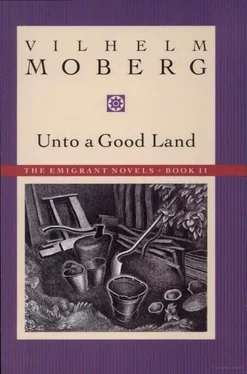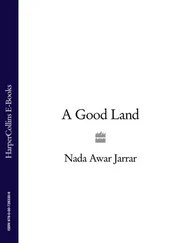Kristina wondered how this woman was created, what she could be made of. Most remarkable of all was the fact that twenty years of whoring had left no visible marks on the Glad One. Since embracing Danjel’s teaching she no longer followed her profession, and lately Kristina had begun to believe that Ulrika’s nature had improved; she was kind to Danjel’s motherless children and took good care of them; this everyone had remarked on. Perhaps she wanted to expiate her life of whoring. Surely, in God’s redemption book much was written concerning Ulrika of Västergöhl; each time her body had been used for fornication was noted. (Ulrika, however, thought that Christ’s blood had washed her clean and that her sins, like a bundle of soiled linen, were tied up in the Saviour’s napkin cloth.)
It had always bothered Kristina that she was forced to use the same privy as Ulrika; she could never forget the great number of men the Glad One had consorted with. In one end of the wagon was a small booth serving as a call-of-nature room for the passengers. Someone was always waiting near the booth, as the immigrants suffered from a severe diarrhea, which had attacked them after landing. But diarrhea was to be expected when they first arrived in America, said their interpreter; it was a special kind of immigrant diarrhea, caused by the change of country and different weather conditions; hardly one newcomer escaped it. Now all of them had been running to the privy this last day, at least once an hour — all except Ulrika of Västergöhl. She seemed to have normal, undisturbed bowels. She had escaped all ills and evils, even the diarrhea. God had verily shown her great patience, even though she was so deeply sunk in sin; yet He had severely tested Uncle Danjel, who always strove to live righteously. The ways of the Lord were inscrutable. But Kristina was grateful that Ulrika did not often use their privy here in the wagon.
For the third time since boarding the train Jonas Petter emerged from the little stall at the end of the wagon, fumbling with his trousers. He had lost weight during the crossing, and his face was pale and sunken. He complained to Karl Oskar: “This plagues one’s bowels!”
“Diarrhea is not dangerous to life; it will pass as soon as the bowels are accustomed to the climate.” And Karl Oskar pulled out his knapsack: “I heal myself with pepper-brännvin. Have a swallow, Jonas Petter.”
He poured the brännvin from its earthen jug into a tin mug, and from a small bag added pepper until the brännvin looked as black as dung water.
“Pour it down fast!”
Jonas Petter emptied the mug of dark pepper-brännvin and made a wry face. “It’s like swallowing burning coals.”
“But it closes the hole. Take another drink in the morning — then you won’t be forever running.”
Jonas Petter said it was a strange invention to sit on a wagon and ride while attending to one’s needs. What would the people at home say if they knew how comfortable they were, traveling with such a contraption! He admitted Americans were smart. This invention saved much time; should the train have to stop each time someone needed to cleanse his bowels, they would have traveled scarcely more than a stone’s throw a day. But he wondered if anyone collected all this human dung so that the earth and the crops might benefit. Or perhaps American soil was so rich that no manure was needed.
Karl Oskar offered some of the pepper-brännvin to Kristina, but she refused it, thinking it too strong for her; she had tried it on the ship but threw it up again. Perhaps this was because of her pregnancy, which also caused her to suffer more than the others from the heat. She had often wondered why God inflicted so many miseries on pregnant women when He Himself created the human lives inside them.
As half her time had passed now, it would soon begin to show that she was with child. No one in their company except Karl Oskar knew as yet how things stood with her. But it couldn’t be kept secret much longer. It was the women who first made such discoveries in each other; they always noticed the signs. Indeed, probably Ulrika already knew — she had seen the shameless creature, from time to time, look searchingly at her body, and even before they left Sweden the Glad One had said to Kristina, in a meaningful tone, that seasickness was much like being in the family way. Kristina had no hiding garment to don; she had not found time to sew herself a forty-week apron before they started out on their journey, and she did not think she would have opportunity to sew one here in America; she had a needle and thread, but not the smallest piece of cloth.
At home it was the custom for a woman to hide her pregnancy as long as possible. But why should she need a forty-week apron far away in a foreign country where she didn’t know a single person and no one knew her? And perhaps no one in this country was offended by women showing their pregnancy. Perhaps they had different customs in North America. She had heard that no one cared how other people lived here or what they did.
But there sat Ulrika staring at her again, as if wondering in which month she might now be. This look on Ulrika’s face angered her; she had a full right to be with child. She lived with her husband in a Christian marriage, she had a known father for her child. But how had it been with Ulrika’s own brats? Who was father to Elin, the girl next to her, now looking after Danjel’s children, sitting this moment with little Eva on her knee? There had been rumors about tramps; the churchwarden in Åkerby had also been mentioned. And who had been the fathers of those children she had lost? Their fathers were known only to God. Ulrika ought to remember this before she stared at honest women.
Kristina would have liked to sew a forty-week apron — if for no other reason than to irritate Ulrika.
— 5—
The immigrants from Ljuder rode on the steam wagon through a green and fertile country. From their train they saw vast fields covered with a thick fell of beautiful crops; in other fields the crops already had gone to seed. They saw meadows with tall fodder grass where cattle grazed in great numbers; in places the grass was so tall that they saw only the animals’ backs. They thought the cattle here must tramp down more grass than they ate; they counted as many as fifty cows together and wondered if such large herds might belong to one single owner. They passed through forests of tall, lush leaf-trees and recognized oaks, maples, elms, and birches. They saw groves of unknown, low trees and wondered what the name of such beautiful little trees might be. Danjel Andreasson thought they might be fig trees, of which Jesus often had spoken in parables and which grew also in the land of Canaan.
They passed through a smiling landscape — it was a fertile world they saw here. A verdant ground promised food for both man and beast, ample crops, and security. Where the earth grew green, there life throve; it marked a good place for people to live.
They were looking for such green places with rich growth in which to build their own homes — here they would have liked to stop and settle, if others hadn’t arrived before them.
Karl Oskar was pleased with what he saw: the earth here seemed rich, and his eyes did not discover a single hindering stone in the fields. As he looked out over the cultivated land he remembered the picture of a wheat field in North America which he had seen in a newspaper at home; the picture had spoken the truth — the American fields lay before his own eyes now, as vast and stone free, as even and fertile, as they had been in the picture. And it was said that still vaster fields existed farther inland.
At times they passed through poorer regions, they saw hills and mountains, morasses, plateaus, and forests of pine trees. But Karl Oskar had not expected the whole American continent to look like the picture of the wheat field.
Читать дальше










